- EAHM meets in Cork to discuss the future
- St. James’s CEO
- Voluntary hospitals seeks to influence healthcare policy
- A €70 million investment in 14 centres
- Sixtieth birthday for Connolly Hospital
- Cross-border health services developing
- Patient safety initiative
- Over 300,000 to benefit from free GP care
- Minister for Drugs Strategy
- National Maternity Strategy
- KPMG Health Adviser
- Health services have to develop telehealth options
- Running for Mercy Foundation
- Bon Secours affiliated to NUI
- Increase in numbers insured
- Mater Private Cork Expansion
- Antidote To Heroin-Related Overdoses
- Study to advance hygiene on hospital wards
- The man who could have been HSE CEO
- FirstLight National Service
EAHM meets in Cork to discuss the future
The European Association of Hospital Managers’ (EAHM) mental health subcommittee held its Spring meeting in Cork on Friday April 10 and Saturday April 11, writes Adrian Ahern.
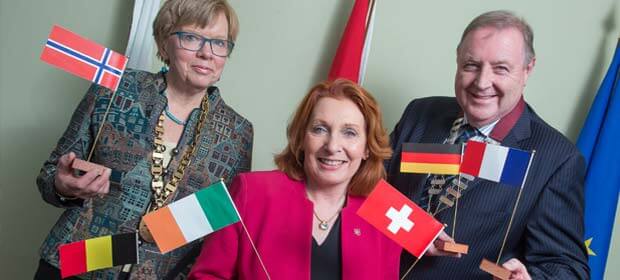
On Friday the group visited local mental health services and met with HSE staff and heard presentations on:
- The South/South West Hospital Group.
- A social work perspective on adult and childrens’ mental health services.
- Police and mental health service co-operation.
- An example of community mobilisation with the “Cork beats Stress” initiative.
- How a sports association (GAA) can facilitate community resilience.
Minister Kathleen Lynch met the group and outlined the main achievements and targets of “a Vision for Change” national mental health policy and participated in the question and answer session.
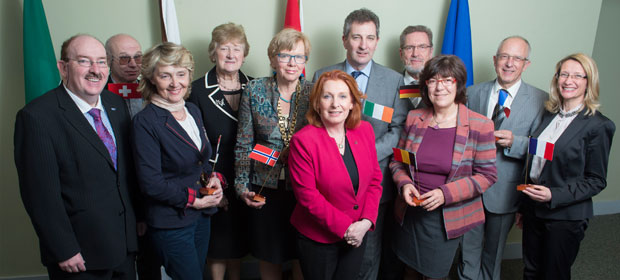
The committee has a membership drawn from the national health management representative organisations from Northern Ireland, Norway, Denmark, France, Germany, Croatia, Luxembourg, Belgium, Switzerland, Republic of Ireland and the current chair is Ms. Inger Kari Nerheim from Norway.
On Saturday the committee held its business meeting in Kinsale at which they discussed amongst other items its focus and goals for the future, issues common across Europe such as decreased funding and development of community based services.
The Chair, Ms. Inger Kari Nerheim was loud in her praise for the local Cork services who presented to the group and Asst. Garda Commissioner Kieran Kenny who shared his experiences of An Garda Siochana and mental health teams working together. Inger Kari also thanked the Minister for her sharing the Irish experience at a policy level and Conor Cusack for his illuminating presentation of community action in the area of mental health.
Mr. Gerry O’Dwyer CEO of the HSE South/South West Hospital Group and first ever Irish President of the EAHM and Mr. Derek Greene, President of HMI attended and presented to the group.
Mr. O’Dwyer said: “I am delighted to host this European-wide gathering of hospital managers who have travelled to Cork to get a first hand insight into mental health services and to share with us the experiences they encounter in their countries. We all take away something from this inspiring educational visit.”
EAHM was founded in 1972 based in Brussels and represents over 17,000 hospital managers from 28 European countries.
St. James’s CEO
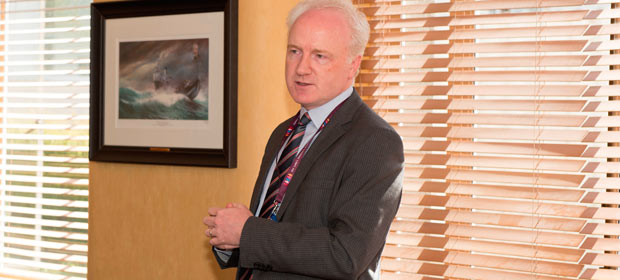
Mr. Lorcan Birthistle has been appointed Chief Executive of St. James’s Hospital, Dublin. He will take up his post in June. He was previously CEO of Our Lady’s Children’s Hospital in Crumlin, Dublin.
Mr. Birthistle succeeds Mr. Brian Fitzgerald, who has moved to become Deputy Chief Executive at the Beacon Hospital, Dublin.
Voluntary hospitals seeks to influence healthcare policy
Twenty leading acute voluntary hospitals from across the country, including the Dublin maternity and children’s hospitals, have come together to establish a new organisation to promote the role of voluntary hospitals at a time of wide-ranging reform in the healthcare sector
The Voluntary Healthcare Forum (VHF) says it aims to promote voluntarism and its contribution to the Irish healthcare system, to participate strategically and to build collaborative partnerships between the healthcare providers, and key decision makers across Government, the Department of Health and HSE and to emphasise the voluntary providers’ contribution to healthcare across the hospital sector.
The VHF as major partners in healthcare provision seeks:
- To be included as of right, in the development and roll out of health system reforms and restructuring arrangements, chief among them the formation of the hospital group structure;
- Recognition that the distinctive contribution of voluntary providers will be developed in ongoing arrangements for healthcare provision
- Agreement that diversity of participation in healthcare provision is to be welcomed and that one size fits all ownership or governance structures are not required to provide best patient outcomes.
Combined, the VHF manages a budget of over a billion euro and provides a third of the care in the acute sector, including many national specialities from cardiothoracic surgery to spinal injuries.
The Voluntary Healthcare Forum has evolved from an initial collaborative initiative between five Dublin voluntary healthcare providers which was known as the North Dublin Voluntary Forum (NDVF). The membership grew as other voluntary providers became keen to share a platform to discuss, develop and action their role in the development of the Irish healthcare system, while acting as a force for positive contribution to patient care and to the service overall. The Voluntary Healthcare Forum wants the reform of the healthcare system to reflect the diversity of healthcare providers, based on evidence and best practice. It is a platform to discuss, develop and action the necessary steps and initiatives to ensure that the voluntary status of service providers is maintained and developed in the Irish healthcare system.
The Voluntary Healthcare Forum wants the reform of the healthcare system to reflect the diversity of healthcare providers, based on evidence and best practice. It is a platform to discuss, develop and action the necessary steps and initiatives to ensure that the voluntary status of service providers is maintained and developed in the Irish healthcare system. Although the Forum is primarily a platform for the Chairs and Boards of the member organisations to achieve common objectives, the VHF is structured to ensure the involvement of hospital Chief Executives. And while organisations representing hospital CEOs and private hospitals as groups have been in existence for many years, there has never been a forum which can act as the voice of the Chairs of voluntary organisations in the acute sector.
The VHF says that as independent organisations, the voluntary hospitals have a degree of autonomy which has repeatedly allowed them to play an advocacy role for the improvement of patient services. Indeed, they would generally see this as an obligation and founding principle.
“In their diverse forms of governance structures, voluntary hospitals have one feature in common which is that they are independently governed, in that they all have their own boards. This brings voluntary hospitals as close as possible to the point of care delivery, helping to guarantee the quality of that care. The sense of identity that comes from independent decision making also fosters innovation and ambition. Many of the major breakthroughs in acute care in Ireland have come in the voluntary hospital sector. Equally many of the national specialties are located in voluntary hospitals. Chairs of voluntary organisations possess an insight into the models of governance of hospitals which can greatly assist current health reforms, chief among them the establishment of the hospital group structure.”
VHF Chair Alan Ashe said, “Ultimately the Voluntary Healthcare Forum is committed to achieving the best possible standard of patient care. We are fully embracing current health policy and are collaborating with the Department of Health and HSE to ensure that the best of what the voluntary hospitals do is reflected in the healthcare reforms now underway, as well as in future policy decisions.”
The Chair of the Coombe Women and Infants University Hospital, Dublin, John Gleeson, said the VHF was fully supportive of the current healthcare reforms, chief among them the hospital group structure. “Under the hospital group structure, hospitals will have to work closer together, whether they are operated by the HSE or VHF members. The question is how do we all work together to achieve better outcomes for all working in and using the health system.”
The CEO of the Mercy University Hospital, Cork Sandra Daly said the voluntary contribution of her board members expertise was invaluable. “The CEOs wholeheartedly endorse the vision of the Voluntary Healthcare Forum and fully support its work and welcome this partnership approach. The chairs and members of hospital Boards who give their time and expertise freely make an invaluable voluntary contribution. “The models of the voluntary hospitals governance structures support the delivery of a high performing organisation which is patient focused.”
Voluntary public hospitals were first founded in the 1720s by philanthropists, doctors, religious orders and active citizens and typically own their land, buildings and infrastructure. Voluntary providers are legally required to comply with all aspects of company law and governance standards, given their legal construct. Their board members are usually selected from community or professional backgrounds and serve without pay. Traditionally, the voluntary hospitals have been able to attract philanthropic support which statutory organisations would never receive.
Members of the VHF
- Cappagh National Orthopaedic Hospital
- Central Remedial Clinic
- Children’s Hospital Group
- Children’s University Hospital, Temple Street
- Coombe Women & Infants University Hospital
- Dublin Academic Medical Centre & Ireland East
- Incorporated Orthopaedic Hospital of Ireland, Clontarf
- Mater Misericordiae and Children’s University Hospital ltd
- Mater Misericordiae University Hospital
- Mercy University Hospital
- National Maternity Hospital
- Our Lady’s Children’s Hospital
- Our Lady’s Hospice, Harold’s Cross
- Royal Hospital Donnybrook
- Royal Victoria Eye and Ear Hospital
- St Vincent’s Hospital, Fairview
- John’s Hospital, Limerick
- Vincent’s Healthcare Group
- Tallaght Hospital
- The Rotunda Hospital
A €70 million investment in 14 centres
The European Investment Bank has approved a €70 million loan in principle to invest in a Public Private Partnership project for 14 Primary Care Centres in Ireland.
The EIB said it represented up to 50% of the finance required to deliver primary care centres at 14 locations.
The EIB will provide cheaper funding than would be otherwise available. The Board has earmarked the Irish Primary Care Centres as the first projects in Ireland expected to benefit from financing under the European Fund for Strategic Investment, a new initiative seeking to support €315 billion of new investment across Europe and to be managed by the EIB.
Since March 2011, 44 Primary Care Centres have already opened through direct investment by the State either by direct build or by means of the operational lease mechanism. Centres are opening at the rate of one a month on average. However, to date none have been built through PPP.
The Department of Health said this announcement from the EIB means that a significant element of funding – up to 50% – has been secured in principle for 14 sites, with work due to start in January 2016. Planning permission is already in place and depending on building size, some will be completed in around 12 months. Plans are also underway for a further 20 centres outside of the PPP project, using more traditional forms of financing, such as Operational Lease or Direct/own build.
Minister Varadkar said: “This is the EIB’s first ever investment in healthcare facilities in Ireland. It’s also our first ever PPP investment in Primary Care Centres. I hope it will encourage other investors to follow suit as the primary care centre delivery model offers a good fit for public and private financing.”
All centres will house GP and community nursing teams and centres will offer extra services, including some or all of the following – Dental, Occupational therapy, Physiotherapy, Social work, Speech & Language, Home Help, Mental health, Counselling,
and Nutrition .
The Centres will be open at least five days a week with extra hours at weekends and evenings for some services.
The Department of Health is the sanctioning authority for the PPP project while the HSE is responsible for managing and delivering the centres. The National Development Finance Agency acts as financial adviser and procurement agency.
It is expected that the primary care centres will be completed over late 2016 / early 2017 depending on the building size. Healthcare delivery will commence immediately thereafter.
The primary care centres will be constructed at HSE Dublin North-East – Dublin north city – Summerhill and Coolock-Darndale, HSE Dublin Mid-Leinster- Kilcock, HSE South – Wexford town, Waterford city, Dungarvan and Carrick-on-Suir, HSE West – Limerick city, Tuam, Westport, Claremorris, Ballinrobe, Ballymote and Boyle.
Sixtieth birthday for Connolly Hospital
Connolly Hospital, Blanchardstown, Co. Dublin has celebrated its 60th birthday of its opening by the then Health Minister, Mr. Tom O’Higgins.
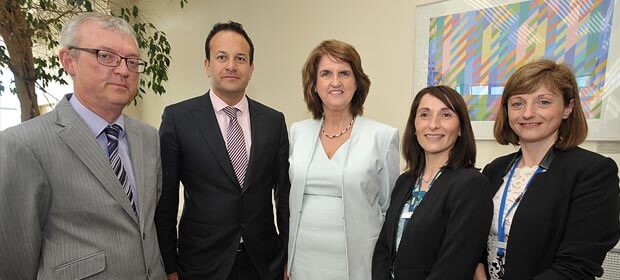
James Connolly Hospital first opened in 1955 as a regional sanatorium to help tackle the TB epidemic. In keeping with the concept of isolating TB patients, the sanatorium was composed of a large number of separate units set in rural parkland.
Sixty years ago there were some people who opposed the then Health Minister, Dr. Noel Browne’s proposal to calling this hospital after one of the leaders of the 1916 Rising and suggested that it should be called ‘St. Bridget’s’ instead.
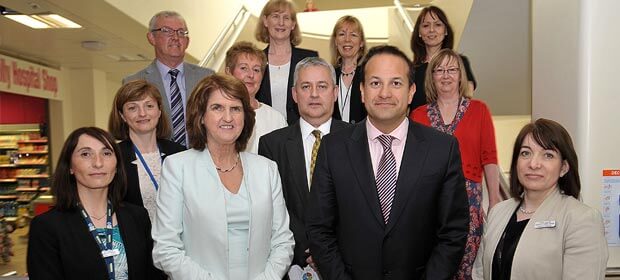
Middle Row: Ms Mairead Lyons, Hospital Manager, Prof Eamon Leen, Clinical Director, Ms Anne Maher, Chairperson, RCSI Hospitals Group, Mr Bill Maher, CEO RCSI Hospitals Group, Ms Rachel Saunders, HR Manager.
Back Row: Ms Shona Schneemann, Deputy Hospital Manager, Ms Caroline Stratton, Finance Manager and Ms Doreen Powell, Risk Manager.
When the James Connolly Memorial Hospital was formally opened as the Dublin Regional Sanatorium, the event was attended by Connolly’s son and daughter, who said how proud they were to see their father honoured in this way.
It became a General Hospital in 1971 in line with the Fitzgerald Report. In 2005, the new hospital building was officially opened and renamed, Connolly Hospital Blanchardstown.
Today, Connolly is a Level 3 hospital within the Royal College of Surgeons in Ireland (RCSI) Hospital Group. It provides emergency, medical, surgical, residential care, day care, outpatient, diagnostic, clinical therapies and support services to a catchment population of 331,000.
Currently, there are 351 beds in Connolly; 224 acute beds, 53 day case-beds, and 74 non-acute beds. There were 33,665 ED patient presentations in 2014 compared to 32,638 in 2013.
A number of major developments have been completed at the hospital in recent years, including the opening of the Endoscopy Unit in 2011 and the refurbishment of the Acute Medical Assessment Unit and opening of the new MRI facility in 2014. Work is also currently underway to provide additional services at the hospital. These include a urology service, a new radiology unit and the scoping of a 100-bed Community Nursing Unit. Connolly Hospital is also one of the sites selected for the development of the new National Children’s Hospital Satellite Centre.
Ms. Mairead Lyons, Hospital Manager said: “Connolly Hospital is committed to the strategic and operational revision of patient centred quality care, delivered with compassion and professionalism by a valued and dedicated staff, whilst ensuring excellence, equity and accountability. Our core value is to put patients at the heart of what we do and how we do it.”
Anne Maher, Chairperson RCSI Hospitals Group said: “Connolly has a proud past and an exciting future. The Hospital Group has many plans for Connolly in terms of developing the Estate and also the services provided. Developments already announced include the building of a Satellite of the new National Children’s Hospital at Connolly. Over the next few years Connolly will be a key part of our overall Group Strategy.”
Cross-border health services developing
People from Donegal will soon benefit from state of the art treatments for cancer and heart attack closer to home in Derry, while children from the North can have specialist heart surgery in Dublin and adults from south of the border can access Deep Brain Stimulation treatments in Belfast, according to Health Minister, Dr. Leo Varadkar.
The Minister was speaking following a visit to Altnagelvin Hospital in Derry to review the continued progress on the construction of the new Radiotherapy Unit there.
He said: “Cross-border co-operation on health is one of the unsung successes of the Good Friday Agreement. There is even more scope for new exciting areas of future co-operation. We are an island of just over six million people and it makes sense to pool our resources to provide better health care for all our citizens.”
Reviewing construction on the Radiotherapy Unit, which started in July 2014, Minister Varadkar said: “Altnagelvin Radiotherapy Unit will significantly improve access to radiation oncology services right across the West Ulster region, on both sides of the border. Among the beneficiaries are people living in Co. Donegal and surrounding areas. It will provide high quality services on their doorstep, on a par with those provided in the Northern Ireland Cancer Centre in Belfast.”
The Irish Government has committed capital funding of €19 million towards construction costs and the HSE will also provide funding for the provision of services to patients from the Republic of Ireland.
The Minister said this funding demonstrated the ongoing commitment to cross border services and to north south radiotherapy services in particular. He looked forward to the opening of the unit next year and the commencement of services to patients. In all, the unit will treat about 1,500 patients per year, of which 385 will be from the Republic.
Patient safety initiative
Tallaght Hospital, Dublin has launched the second of its patient safety initiatives in the Zero Harm series with the focus on reducing preventable harm related to medicines through innovation and public information.
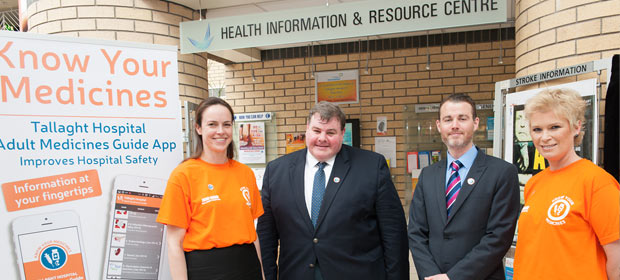
Medication has been found to cause serious adverse reactions in 4% of patients and can lead to profound and devastating effects on patients and their carers, in addition to prolonged and more resource intensive hospital care. Tallaght Hospital is tackling this by focusing on a series of initiatives to help improve medication safety.
The Tallaght Hospital Adult Medicines Guide, first published in hardback in 2000, available in app format since October 2013, has been upgraded. The new app enhances the existing app already being used by 500 healthcare staff in the hospital as an in-house, evidence-based source of medicines information and prescribing protocols.
Most drug related harm occurs within a limited group of medications and drug classes i.e. anticoagulants, opioids, antimicrobials, insulin and diuretics. These medications and classes, along with general information on understanding and avoiding medication error are the focus of an e-learning program ‘Drug Safety – High Risk Medications’. As part of the Zero Harm initiative, healthcare professionals who prescribe, administer, dispense or monitor medication therapy in the hospital are being encouraged to complete the e-Learning program.
The Zero Harm initiative is also working with patients, families and parents through the introduction of a ‘My Medicines’ leaflet in which they can document a list of their current medicines, to help hospital staff treat them safely in the hospital. Zero Harm messages which act as a prompt to patients and their carers to bring their medicines list to appointments and when being admitted are also being incorporated into Out Patient / Elective admissions communications. By including the prompt into hospital communications they will be reminded of the importance of knowing their medicines and working with hospital staff to improve safety.
Tallaght Hospital’s CEO David Slevin said: “The Zero Harm initiative is a series of patient safety initiatives built on the expert clinical resources we have in Tallaght Hospital. Our Pharmacy Department is at the forefront of innovation in its field and this initiative puts their knowledge at the fingertips of our healthcare staff 24/7. Patient engagement is also a key element of this initiative and so we are also building in safety messages regarding medicines into our communications with patients, their parents and carers.”
Tallaght Hospital’s Head of Pharmacy, Tim Delaney said “Almost all patients use medication during their hospital stay and so it is vital that we equip prescribers with access to up-to-date expert information on medications in real time, when they are making decisions. Also, 70% of preventable death or serious adverse reactions are due to nine drugs or classes so constant education on these high risk medications is important. ‘Zero Harm – Know Your Medicines’ follows best international practice to utilise technology and patient engagement to reduce instances of medicine-related harm.”
The clinical pharmacy service at Tallaght Hospital has a track record of innovation in relation to medication and is currently rolling out a new model of care called PACT (Collaborative Pharmaceutical Care at Tallaght). The PACT model has reduced potentially serious adverse medication events at discharge from 6% to zero – demonstrating the capacity for innovation to influence health outcomes.
Over 300,000 to benefit from free GP care
An additional 270,000 children under the age of six will benefit from GP care free at the point of service, under the new proposed new GP contract, according to the Department of Health.
This will entitle them to age-based preventive checks focused on health and wellbeing and the prevention of disease. These assessments will be carried out when a child is aged two and again at age five, in accordance with an agreed protocol.
The contract will also include an agreed cycle of care for children diagnosed with asthma, under which GPs will carry out an annual review of each child where the doctor has diagnosed asthma.
The extension of GP care free at the point of service to everyone aged 70 or over who is not at present covered by a medical card or a GP visit card, is expected to benefit about 36,000 new patients. It will be provided under the existing contractual arrangements for this age cohort.
The negotiations with the Irish Medical Organisation also resulted in an agreement on the introduction of a Diabetes Cycle of Care. This will enable patients with a medical card or GP visit card and who have Type 2 Diabetes to avail of two annual visits to their GP practice for a structured review of their condition. This service will begin in the last quarter of this year.
This objective of this initiative is to help to integrate care across the continuum of care to will improve clinical outcomes for patients and reduce complications often experienced with this condition.
Minister of State, Kathleen Lynch said: “The developments which have been agreed through intensive engagement between the Department of Health, the HSE and the IMO lay the groundwork for a wider and more appropriate range of services to be provided through primary care. I look forward to further progress being achieved in the discussions on the GP contracts generally, which have begun in recent weeks.”
The Minister for Health has determined that an annual capitation rate of €125 per patient shall apply, with enhanced capitation payments in respect of children covered by the asthma cycle of care, at €50 for year of diagnosis and €45 for each subsequent annual check.
The Department of Health said that it was estimated that in a full year, the additional cost of the universal under-6 service, including the preventative wellness checks and arrangements for management of asthma in general practice, will be approximately €67m.
The cost to the Exchequer of the proposed legislation for a universal over-70s GP service is estimated at €18 million in a full year. This service will be provided under the existing GMS GP contract and there is no change in GP fees in respect of this service development.
It has also been agreed that a Diabetes Cycle of Care will be introduced for GMS and GP Visit Card patients with Type 2 Diabetes. This will provide structured care for this condition for patients in this category, on the basis of two specific visits per year to review the patient’s condition.
GPs will be paid a registration fee in the first year at €30 per visit, with enhanced capitation payments to reflect two annual visits at €50 per visit. The clinical content of this service has been agreed between the parties and participating GPs will be required to submit appropriate data to the HSE to enable the effectiveness of the arrangements to be monitored and assessed.
The detailed arrangements in relation to this service will be finalised between the parties over the coming weeks, in order to enable this service to begin in the last quarter of 2015.
The costs associated with this initiative are estimated at approximately €4.5m in 2016.
Minister for Drugs Strategy
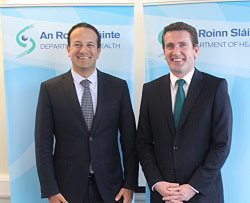
Mr. Aodhán Ó Ríordáin has been appointed as Minister of State for the Drugs Strategy. Mr. Ó Ríordáin, a Dublin Bay North deputy, is already a junior Minister at the Department of Justice and at the Department of Arts, Heritage and the Gaeltacht
Welcoming his appointment, Health Minister, Dr. Leo Varadkar said: “There is a lot of merit in appointing a cross-Departmental Minister for Drugs, as there is a significant overlap between Health and Justice in this area, ranging from treatment and prevention to enforcement and diversion. The new role will bring together the work and actions of the HSE and Gardai among others.
“Aodhán is being appointed at a good time as the Department has just started work on the new National Drugs Strategy. Extra funding of €2.1m has been allocated in 2015 to provide more residential treatment and rehabilitation places, more needle-exchanges and the Naloxone pilot project. I have also ended the cycle of cuts in funding for Local Drugs and Alcohol Taskforces. The HSE will shortly launch a pilot project to make Naloxone available to opiate users in an effort to reduce deaths from overdose. The Oversight Forum for Drugs continues to meet and its latest meeting takes place this week.
“Clearly the drugs issue remains a major challenge, particularly in urban areas but also in rural parts. I wish Aodhán the very best in his new role. I know that he is committed to the equality agenda and has an excellent track record of community work.”
National Maternity Strategy

The Minister for Health, Dr. Leo Varadkar has announced the establishment of a Steering Group to advise on the development of a National Maternity Strategy.
“In Ireland we have very good maternity care which is reflected in the fact that perinatal and maternal mortality rates are on a par with our international peers. Nonetheless, a number of high profile cases in recent years have given rise to public concern about the safety and quality of maternity services,” Minister Varadkar said. “For these reasons, I am appointing a Steering Group to prepare a new National Maternity Strategy for Ireland. In doing so, I am implementing one of the recommendations of the HIQA Report into the care of Ms Savita Halappanavar.
“The new National Maternity Strategy will put the needs of mothers, babies and their families at its centre. The focus will be on maximising patient safety, quality of care, clinical outcomes as well as the desirability of greater patient choice, the move towards more services in the community, and a renewed focus on prevention and wellbeing. I have asked the Group to report to me by the end of the year.”
The Steering Group will be chaired by Sylda Langford, former Director General of the Office of the Minister for Children and Youth Affairs and currently a member of the Board of the Child and Family Agency. Ms. Langford has extensive experience in policy and legislative work across a number of government areas, and a professional background in social policy and social work. The Group includes service user representatives as well as representatives of a wide range of specialties relating to maternity services.
Announcing the membership, the Minister said: “The Steering Group will play a key role in shaping the future of maternity care in Ireland. Collectively they bring a wealth of knowledge and experience to the table and I am very grateful to each of them for agreeing to undertake this important work.”
The Group is expected to conclude its work by the end of the year
The Membership of the Group is as follows:
- Chair: Ms. Sylda Langford, former Director General of the Office of the Minister for Children and Youth Affairs.
Other members :
- Professor Cecily Begley, Chair of Nursing & Midwifery TCD
- Ms. Mary Brosnan, Director of Midwifery, National Maternity Hospital
- Ms. Teresa Cody, Principal Officer, Primary Care, Dept of Health
- Professor Colette Cowan, CEO, UL Hospital Group
- Ms. Sinead Curran, Dietitian, National Maternity Hospital
- Dr. Miriam Daly, Director Women’s Health Programme, ICGP
- Professor Declan Devane, Professor of Midwifery, NUI Galway
- Ms. Mary Gorman, Clinical Nurse Manager II, Our Lady of Lourdes Hospital, Drogheda
- Dr. Colm Henry, HSE National Clinical Advisor& Group Lead for Acute Hospitals
- Ms. Dawn Johnston, Group Director of Midwifery, Saolta Hospital Group
- Ms. Susan Kent, Deputy Chief Nursing Officer, Dept of Health
- Ms. Shauna Keyes, Service User Representative
- Ms. Krysia Lynch, Chair, AIMS Ireland
- Dr. Kathleen MacLellan, Director of Clinical Effectiveness, Dept of Health
- Ms. Roisin Molloy, Service User Representative
- Dr. John Murphy, HSE National Clinical Lead for Neonatology
- Dr Meabh Ní Bhuinneain, Consultant Obstetrician and Gynaecologist, Mayo General
- Mr. Pat O Dowd, HSE Assistant National Director, Primary Care
- Ms. Joan Regan, Principal Officer, Acute Hospitals Policy, Dept of Health
- Ms. Mary Reilly, Clinical Midwife Manager II, Cavan General Hospital
- Ms. Grace Rothwell, Hospital Manager, South Tipperary General Hospital
- Professor Jane Sandall, Chair in Social Science and Women’s Health, King’s College London
- Ms. Monica Sheehan, Director of Public Health Nursing, Kerry Community Care Services
- Dr. Sharon Sheehan, Master, Coombe Hospital
- Dr. Dubhfeasa Slattery, Head of Clinical Risk, State Claims Agency
- Ms. Sheila Sugrue, HSE National Lead for Midwifery
- Ms. Pauline Treanor, Secretary & General Manager,Rotunda Hospital
- Professor Michael Turner, Clinical Lead for Obstetrics and Gynaecology
KPMG Health Adviser
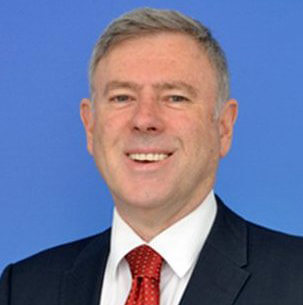
Dr. Tony O’Connell, former HSE National Director of Acute Hospitals has been appointed as a Special Health Adviser to KPMG Australia.
Dr. O’Connell resigned from his HSE post in January of this year to return to Australia. He had held the post of HSE National Director of Acute Hospitals for just nine months.
He originally came to Ireland to take up the post of Group CEO for the RCSI Hospitals (the Dublin North East Hospital Group) and was headhunted by the HSE for the post of National Director of Acute Hospitals, following the appointment of the then National Director, Mr. Ian Carter as HSE National Director of Quality, Assurance and Verification.
Health services have to develop telehealth options
Health care cuts and increasing numbers of older patients mean that health services internationally will have no choice but to develop ‘telehealth’ options according to research work being undertaken in Flinders University in Australia, Ms. Mo Flynn, Chief Executive of Rehab and President of the Irish Gerontological Society, told the 8th International Association of Gerontology and Geriatrics European conference held in Dublin.
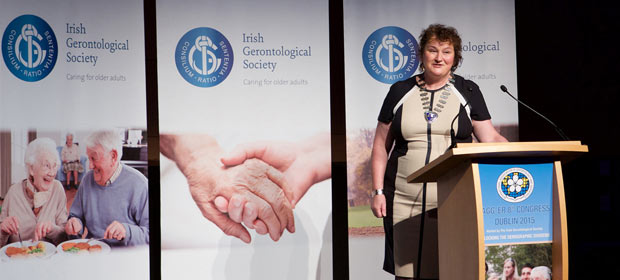
She said that according to the European Commission, the number of citizens over 65 would increase to almost 30% between 2010 and 2060, while the number of those aged over 80 would nearly triple. During this time, health and social care services across Europe needed to adapt to a growing demand, while facing a shrinking labour force no longer able to provide for the growing needs of an ageing population.
Whilst these changes could bring numerous challenges, they presented considerable potential for Europe to lead the world in developing new markets of age friendly ICT products and services.
Ms. Flynn said our first challenge arose with any attempt to describe the ageing population as a single entity because of the huge age range, from 65 to 100 plus. “Stereotypes are prevalent and unfortunately older age is still associated with ill-health, inactivity and decline. There is such brilliant diversity in older age now – you really can’t generalise about a group which may range over a forty year lifespan.
“If people in their 70s, particularly women, gave up helping their family, and their communities, our health and social care services would collapse.
”Figures from the Family and Childcare trust report that 2.3 million grandparents say that they look after their grandchildren in order to enable the children’s parents to go to work.
“Older people could do even more if we did not let negative social attitudes and stereotypical views inhibit us in offering older people opportunities to engage more in civil society.
“Ageing is not an inevitable drain on health-care resources. Research about the cost of dying shows that proximity of death is a more important predictor of high acute health-care expenditure than is ageing alone. The cost of dying is actually lower in the older old age groups, which is probably because of a combination of individuals who live the longest being healthier and the rationing of access to health services for older people driven by levels of ageism in medical practice…
“Modern life is making us lonelier, and recent research indicates that this may be the next biggest public health issue on par with obesity and substance abuse. A recent review of studies indicates that loneliness increases mortality risk by 26%.
In a recent study, loneliness was reduced in older people in residential care when they were given training in social media use so they could remain in contact with family and loved ones. This was also evidenced through the Connect project that my former colleagues in Our Lady’s Hospice introduced.
Running for Mercy Foundation
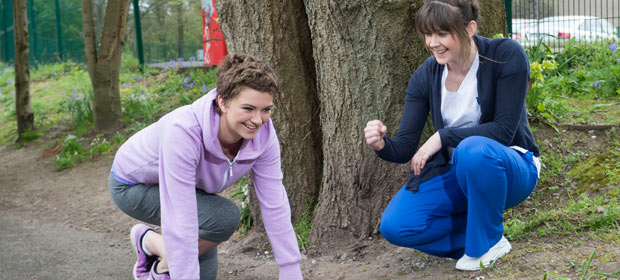
Bon Secours affiliated to NUI
The Bon Secours Hospital Galway has been recognised as an affiliated teaching hospital of NUI Galway following an agreement between the two institutions.
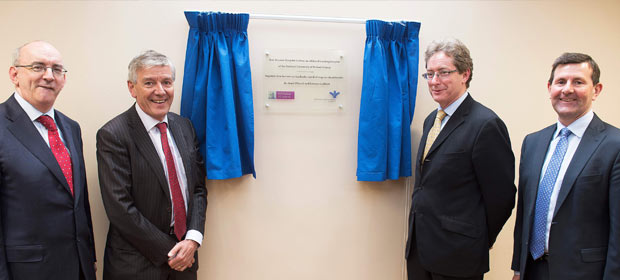
The Memorandum of Understanding will mean that NUI Galway will now offer clinical placement opportunities to final year Medical Students in Bon Secours Hospital as part of their final year Training Programme. Student nurses from NUI Galway already fulfil part of their degree course training in Bon Secours Hospital.
Mr. Gerry Burke, Chief Executive Officer, Bon Secours Galway said “We are delighted to announce that Bon Secours Galway is now an affiliated teaching hospital of NUI Galway. It is an honour to be recognised as a teaching hospital of the College and our dedicated consultants and staff will now have an opportunity to pass on their skills and help develop the medical professionals of the future.
Increase in numbers insured
The number of people with health insurance has increased by 80,000 since the start of this year. In April alone some 74,000 people took out health insurance before the introduction of Lifetime Community Rating on May 1.
This latest boost in membership numbers represents a surge in the recent upward trend, which has now risen for three quarters in a row. The number of people who currently hold health insurance now stands at 2.105 million.
Health Minister, Dr. Leo Varadkar said he and his officials “are now working on more proposals to improve affordability later in the year. I believe that health insurance needs to be made more affordable before we consider how it could be made universal.”
Mater Private Cork Expansion
Mater Private Cork, the new 75 bed hospital at City Gate, Mahon, has announced the expansion of its services and consultant team at its Heart & Vascular Centre, which provides rapid same day access for emergency/urgent cardiac care, including chest pain, arrhythmia, and heart failure.
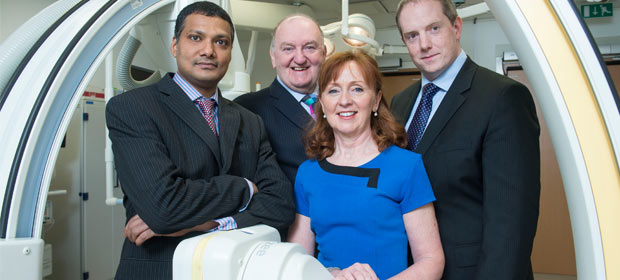
Ms. Anna Fitzgerald, Chief Executive Mater Private Cork and Dr. Ronan Margey Consultant Interventional Cardiologist and lead clinical cardiologist at the Heart & Vascular Centre at Mater Private Cork
The hospital says that as “the latest and most modern invasive and non-invasive cardiac facility in Munster, the Centre undertakes several procedures not previously available in the region.”
Dr. Ronan Margey, Consultant Interventional Cardiologist and lead clinical cardiologist at the Heart & Vascular Centre at Mater Private Cork said “The enhanced services, some of which are not available elsewhere in Munster, will revolutionise what’s available to private healthcare patients and their GPs. The Centre will provide acute same day evaluation for common cardiac invasive and non-invasive emergencies, i.e. chest pain, arrhythmia, breathlessness, and syncope from 8:30am to 5pm Monday to Friday and 24-hour cover outside those hours by direct communication with the consultant on call.”
He said patient care will include highly specialist services not available elsewhere in Munster such as trans catheter valve replacements, with the patient evaluation and follow-up performed in Cork, and the procedure performed by their consultant in Dublin.
Ms. Anna Fitzgerald, Chief Executive at Mater Private Cork said, “The Heart and Vascular Centre at the Mater Private Cork is an integrated partner of the Heart & Vascular Centre at the Mater Private Hospital Dublin, a national leader and tertiary referral centre, which provides a large volume of specialised cardiac services to patients all over Ireland for the diagnosis and treatment of ischaemic heart disease, cardiac rhythm disorders, valvular disease and vascular disorders. We offer a seamless service to those who require cardiac procedures, with the benefit of highly experienced coronary care professionals in both hospitals working together to provide a world-class service to coronary care patients.”
Mater Private Cork provides 23 specialties at the Cork hospital, including cardiology, orthopaedics, ophthalmology, gynaecology, urology, dermatology, plastic surgery, general surgery and gastroenterology.
Antidote To Heroin-Related Overdoses
The HSE has made naloxone available for prescription and supply to opioid drug users under an initiative aimed at reducing drug-related deaths and near-fatal drug poisonings.
Naloxone is an antidote used to reverse the effects of opioid drugs like heroin, morphine and methadone if someone overdoses.
The HSE is currently undertaking a demonstration project to assess and evaluate the suitability and impact of using a prefilled Naloxone injection which is designed for non-medical administration in Ireland. The overall objective of the project is to make naloxone more widely available for opioid drug users.
The project involves 600 opiate users receiving take-home naloxone on prescription. It will also include those recently released from custody who have been identified as at high risk of opioid overdose. These drug users and those close to them have been trained on how to administer naloxone, which comes in a pre-filled syringe, and to recognise the signs of an overdose.
Health Minister Dr. Leo Varadkar said: “This project could make an enormous difference when it comes to reducing drug-related deaths. Research shows that providing increased access to naloxone for people likely to witness an overdose, such as the family, case workers and friends of a drug user, is an effective way of reducing overdose deaths.”
Minister of State with responsibility for the National Drugs Strategy, Aodhán Ó Ríordáin said: “I have no doubt that lives will be saved as a result of this initiative. Every drug-related death is a tragedy for the families and friends of the person involved and has a considerable impact on communities and society as a whole. The provision of naloxone to those most at risk, and to their families, is a real step in the right direction”.
The Naloxone Demonstration Project has been undertaken in response to an action in the National Drugs Strategy aimed at dealing with the rise in drug-related deaths. According to the latest figures available, a total of 350 people died in 2012 as a result of the toxic effects of one or more drugs. 220 of these deaths involved opiates, including heroin and methadone.
Study to advance hygiene on hospital wards
The Health Innovation Hub is carrying out an Infection Prevention and Hygiene Management study at South Infirmary Victoria University Hospital and University Hospital Waterford.
In partnership with the South South West Hospital Group, Surewash, Gabriel Scientific and MEG Medical eGuides – this study will seek to quantify the impact of an innovative quality improvement programme, and will aim to advance routine infection prevention and control measures in hospital orthopaedic wards.
The study, which will run for 12 months, consists of three interventions in a test ward and comparison to a control ward. These interventions are to be delivered by Surewash, an interactive hand washing training video pedestal that teaches the correct hand washing procedure based on gaming technology, SleepAngel which has created impervious, sanitisable heat sealed pillows, and MEG Medical eGuides which has produced a Hand Hygiene Audit tool that allows electronic auditing of hand washing technique and provides a collation of results.
The man who could have been HSE CEO
Professor Aidan Halligan, who died suddenly on April 27 at the age of 57, was the man who could have headed up Ireland’s health services as first CEO of the HSE.

Then Deputy Chief Medical Officer for England, he was offered the Irish post in 2004 following a national and international recruitment drive.
Initially, it was announced that he would take the job, but then he decided against it for family reasons, sparking off considerable debate since then on the direction which the health services might have taken if he had returned home.
Committed to health service reform, and a gifted orator, he was very supportive of health service development in Ireland over the years, giving generously of his time and travelling to Ireland frequently for meetings and conferences. Last year he delivered the 2014 annual IMO Doolin Memorial Lecture entitled ‘Rediscovering Lost Values,’ and had accepted an invitation to speak at the autumn annual conference of the Irish Hospital Consultants Association.
A native of Dublin, Aidan Halligan was educated at Templeogue College, Dublin, and studied medicine at Trinity College, Dublin, graduating in 1984.
He went on to work in England, specialising in obstetrics and gynaecology. He was appointed Consultant Obstetrician Gynaecologist at the University of Leicester and Leicester Royal Infirmary in 1994 and became Professor of Fetal Maternal Medicine at the University of Leicester and University Hospitals of Leicester in 1997.
He was the first NHS Director of Clinical Governance and went on to become Deputy Chief Medical Officer for England from 2003 – 2005, with responsibility for issues of clinical governance, patient safety and quality of care across the NHS in England.
In 2006, he was appointed CEO Elision Health Ltd and in 2008 Chief of Safety Brighton and Sussex University Hospitals Trust.
Earlier this year he was appointed Director of Well North, a Public Health England initiative to improve the health of the underprivileged across the North of England. He was Principal of the NHS Staff College for leadership development and Chairman of Pathway, a charity that has developed health services for the homeless within the NHS.
He is survived by his wife, Carol, children Molly, Rebecca and Daisy, mother Maureen, brothers and sisters including Ursula Halligan, Political Editor TV3.
FirstLight National Service
Heath professionals have been encouraged to refer any parents or families who have lost a child to the FirstLight national free service which provides support to those who have lost a child regardless of the circumstances.
A spokesperson said that FirstLight, which was previously known as the Irish Sudden Infant Death Association, provides professional and qualified care, compassion and professional support to bereaved parents and families.
“We have been there for parents and families for 35 years, helping them find the first flicker of hope…. The First Light.
“We also promote research into the sudden, unexpected, often unexplained death of a child. Every year in Ireland over 400 children die suddenly, unexpectedly and often without explanation.
“We would encourage health professionals to refer any parents or families that lose a child to our support service. Our Head of Bereavement is Ms. Ger O’Brien, Tel 01 8732711, National Lo Call Helpine 1850 391 391, support@firstlght.ie www.firstlight.ie

